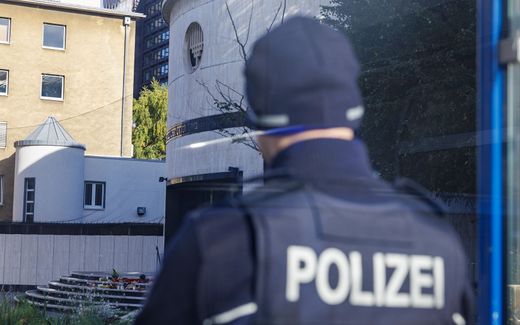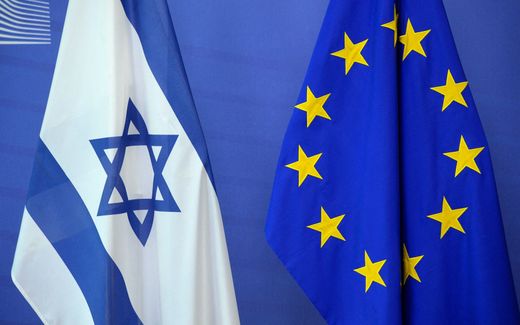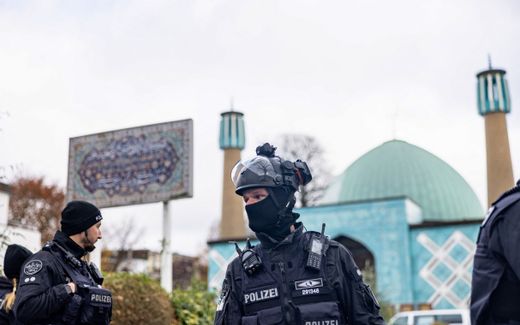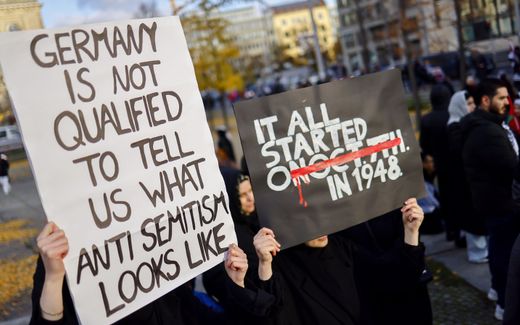Six reasons why anti-Semitism remains a problem in Europe

A protester holds reading "Coexist" during a demonstration to protest against antisemitism. Photo AFP, Justin Tallis
European Union
Since the Hamas attacks on Israel on October 7, there has been a rise in the number of anti-Semitic incidents all over Europe. Pro-Palestinian demonstrations that call for the extermination of Jews are attended by hundreds of people. Why?
The significant increase in anti-Semitism in Europe is remarkable because, after the Second World War, the majority of countries vowed a "never again" after the horrors of the Holocaust. Now, it turns out that anti-Semitism has, in fact, never left the continent. Where does this sentiment come from?
- Christian history
European anti-Semitism has ancient papers. Its foundations can be traced back as far as the Middle Ages. The roots of this disdain for Jews are reflected in the Christian beliefs that dominated society at the time. Christians saw the Jews as the people who crucified Jesus and, as a result, regarded them as inferior citizens, research shows. Roman Catholic popes subjected Jews to restrictions and, at best, tolerated them.
These attitudes did not change with the Reformation. The German reformer Martin Luther is infamous for his views on the Jewish people, calling them at the end of his life a rejected race and even calling for attacks on them, for instance.
Even though anti-Semitism is largely secularised by now, not so long ago, during the Second World War, for example, the Nazis drew thankfully from Luther's teachings to justify their genocide.
- Prejudices
Prejudices about the Jewish people fuel hatred towards them. In the early 19th century, the belief grew that Jews conspired to dominate the world with their intelligence and money, the United Holocaust Memorial Museum explains on its website. This myth is one of the many that portrays Jews as a threat to society. Other prejudices about the Jewish people are linked to their genetic characteristics, as shown by the Nazis during the Second World War.
Earlier, CNE.news reported that anti-Semitism seems to grow whenever the economy collapses. This shows that the old conspiracy theories about Jews dominating the world economy are still believed and circulated.
Dutch professor of Jewish Studies, Bart Wallet, pointed out that in times of crises people feel like they are losing control over their lives. "They become more susceptible to conspiracy theories, which are mixed with anti-Semitism easily."
The recent global crises may thus have been a catalyser for anti-Semitism to raise its head. During the Covid pandemic, Jews were blamed of trying to gain world dominance via vaccines, for example. Also, economic problems and wars that followed the pandemic caused global unrest and insecurity.
The CNN research shows that old anti-Semitic stereotypes are still alive and kicking. In Poland and Hungary, about 40 per cent of the population believes that Jews have too much influence in business and finance around the world. More than a quarter of the Poles and Hungarians are convinced that Jews have too much political influence. Still, Jewish people feel safe in those countries, as two leading rabbis said in the past weeks.
- Polarisation
Polarisation is also likely to have contributed to the increased levels of anti-Semitism seen all over Europe. However, both the far-right and the far-left have anti-Semitic tendencies.
The far-right has a long history of anti-Semitism, mixed with other kinds of racism. Right-wing populism often comes with nationalist ideologies that tend to promote hatred towards those with a different ethnic origin, including the Jews.
The far-left has anti-Semitic roots in Marxism, the Neue Zürcher Zeitung analysed recently. Nowadays, the left portrays the Palestinian struggle against Israel as a battle between the oppressed and the oppressor, in which Palestine deserves support and Israel is the ideological enemy, Die Tagespost writes. As a result, the inherently anti-Semitic organisation Hamas is celebrated while Israel receives severe criticism.
Recently, Kasja Ekis Ekman, a Swedish author and journalist, openly called for an “intifada”, which stands for attacks on Israeli civilians, Varlden Idag writes. Earlier, she had described the mass murder on October 7 as justified “resistance”.
Also, in Swedish largest Facebook group for women and non-binary people anti-Semitism has become a habit, Expressen reported. Researcher Christer Mattson even spoke about anti-Semitism at the level of Goebbels, Hitler's head of propaganda during the Holocaust.
Even the well-known Black Lives Matter movement that prides itself in fighting racism has shown anti-Semitic tendencies, NZZ. Only three days after the Hamas attack, the movement spoke out its support for the Palestines.
- Social media
Social media does not only accelerate polarisation but also serves as a platform for anti-Semitism. After the Hamas attacks on October 7, the Institute for Strategic Dialogue reported an immediate increase in anti-Semitic expressions on social media platforms.
The platforms serve as an ideal means to spread conspiracy theories but also serve as a medium to distribute images from the conflict in Israel. According to the study from the Institute, the surge in anti-Semitic posts and conspiracy theories happened simultaneously with Israel's mobilisation against Hamas.
In addition, the Internet –including social and regular media– can easily give a distorted image of reality, Seurakuntalainen writes. Many news media focus on the suffering of Palestinian children, and although their pain is immense, the sorrows of the Israeli children should not be forgotten, the Finnish news website argues.
The German chairman of the Kreuzberg Initiative against Anti-Semitism (KlgA), Dervis Hizarci stresses the importance of reaching young people in the fight against anti-Semitism. An important part of this is by analysing their sources of information, Hizarci said, as reported by Evangelische Zeitung.
- Immigration
Anti-Semitism is relatively high among immigrants, the Birkbeck Institute for the Study of Anti-Semitism concluded after doing research. This could be because of the tension between Muslim countries and Israel.
For example, the German Islam Conference, which met last week, is criticised for not sufficiently addressing the seriousness of anti-Semitism in the country, PRO writes.
Also, research in Norway shows that anti-Semitism is prevalent among Muslims in the country, Vart Land reported on Tuesday. A report concludes that this anti-Semitism is growing because Muslims feel solidarity with Palestinian Muslims.
Nevertheless, the Birkbeck Institute for the Study of Anti-Semitism did not find a significant link between a growth in the number of immigrants from the Middle East and North Africa and a rise in anti-Semitism.
- Decreased knowledge of the Holocaust
In the first period after the Second World War, societies were deeply aware of the seriousness of anti-Semitism and what it could lead to. Now, this has changed. Only a few survivors of the Holocaust are still alive. During the CNN poll, a third of the respondents acknowledged that they knew little to nothing about the Holocaust. Michael O'Flaherty, the European director of the Agency for Fundamental Rights, told the Guardian that this may reduce the threshold for anti-Semitism. He calls for better education of children on the topic.
Study on anti-Semitism
CNN conducted a [study]https://edition.cnn.com/interactive/2018/11/europe/antisemitism-poll-2018-intl/) on anti-Semitism in Europe. This revealed in 2018 that a third of the Europeans, for example, believe that Jews use the Holocaust to advance their own position and goals. Many people seem to have forgotten about the terrors of the genocide. A third of the 7000 respondents from Austria, France, Germany, Great Britain, Hungary, Poland and Sweden are convinced that Israel uses the Holocaust to justify its actions. It is not unlikely that these numbers have risen since the attack of Hamas on Israel.
Related Articles












